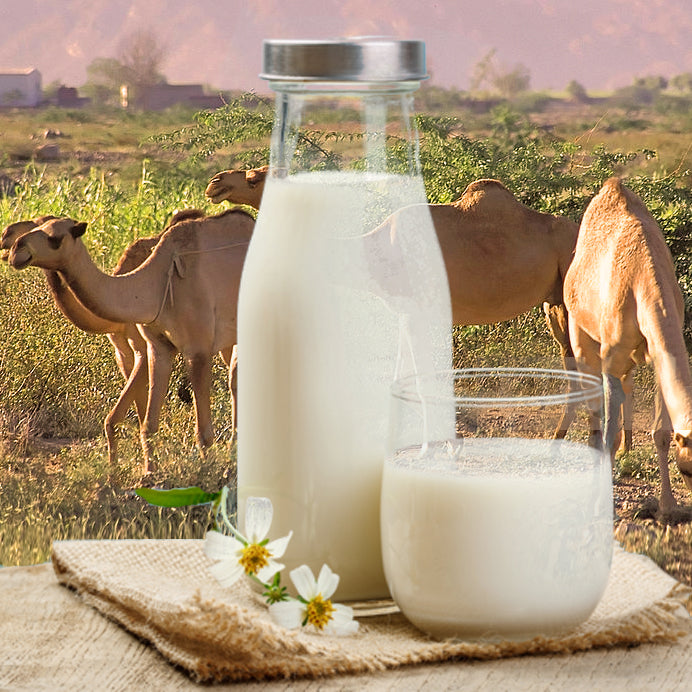
I love goats milk (and goats milk kefir) and recently we've experimented with horse and donkey milk. But I kept hearing about the benefits of camels milk from health experts, so I had to find out if it was just another fad or something more.
The more I researched, the more I was fascinated by its rich history and impressive new studies. I had to try it and I had to make kefir out of it.
Why camel milk?
Camel milk contains enough nutrients to sustain human life for extended periods. In the middle east, herders survived solely on camel milk for long periods of time as they moved the camels long distances to new grazing areas.
It's very similar to human breast milk. In many countries around the world, camel milk is given to children who are malnourished or to supplement breast milk.
It may be new to the western world, but people in the middle east know if its benefits. According to Jordanian researchers, camel milk was used to "maintain good health and treatment of diverse diseases".
Compared to cows milk, it has 3 times as much vitamin C and 10 times as much iron. It has more fat and protein, but less cholesterol.
Different protein structure
Camels are not hoof animals like cows and goats and their protein structure is unique as well There are no A1 caseins that cause issue to many people. People who are allergic to dairy, typically can drink camels milk without a problem. There was a story I read about someone who had a severe dairy allergy and consumed camels milk for a time and was then able to handle cows milk. This result may have happened due to camel milks supposed ability to heal any food allergy.
Blood sugar and diabetes
Camels milk should not cause a blood sugar spike. It contains high levels of insulin, its easily absorbed and new studies are showing that its actually an effective treatment for diabetics.
In a large systematic review of 22 studies on camel milk and diabetes, all but one study demonstrated benefit by lowering blood sugar, decreasing insulin resistance and improving lipid profiles. That's impressive.
When camel milk is made into kefir, it will have even less sugar and be even easier to adsorb. It would improve the natural properties of camels milk even further.
Allergies, autoimmune and autism
Many people who drink milk kefir have health issues that involve autoimmune and allergy type issues. Camel milk is showing a very promising ability to help heal allergies and immune dysfunction. It has immunoglobulins and antigens that are smaller than humans, which gets to the bloodstream. In one impressive study, camel milk helped all 8 children recover from food allergies. The results were better than they expected. It does look like the study was done with raw milk.
Anecdotally, there's plenty of evidence that it helps with autism as well. Simply do a google search and you will find plenty of stories of autistic children recovering or having improved symptoms even after a short time on camels milk.
Why camel milk kefir?
Home made kefir makes the whatever milk you use, even better. All those beneficial properties and nutrients of camels milk will stay and will only be improved by the kefir grains.
There are more vitamins such as B and K2 and all the vitamins are more readily available in the fermented form.
Bio-active peptides from the fermentation also improve the quality of the milk and its health properties.
Although sugar does not seem to be an problem with Camels milk, it will lower the amount of sugar and in turn create more beneficial lactic and acetic acids.
And of course, you get the benefits of the probiotics added. It may be very hard to get raw camel milk as the biggest online producer of camels milk in the united states now unfortunately only offers pasteurized camels milk (which will contain less natural probiotics). The kefir grains will certainly improve the pasteurized camels milk and add back beneficial strains of bacteria and yeast.
How does camel milk kefir taste?
The kefir sets up quite nice and creamy. Not as sweet as cows milk, but still pleasantly sweet and tangy. It's a little bit more gamey than cows milk, but not as bad as goats milk. It also has a bit of a salty aftertaste which I thought was good.
Unfortunately, it is quite pricey to buy camel milk, but it may be worth a try if you have any kind of dairy issue. It may be especially important if you or a family member suffers from any kind of food allergy or autoimmune issues. But keep in mind that pasteurization kills the immunoglobulins which is the main benefit for allergies and immune type issues. So locate a source of raw camels milk if possible.


Comments
Yemoos Nourishing Cultures
Tania – Yes absolutely. The grains will adapt to the new camel milk without too much issue. If they are healthy grains, then the first batch with camel’s milk should be drinkable and they will just adapt even more as you do more batches.
September 10, 2019
Tania
I have started to make kefir milk at home using cow’s milk with live kefir grains that I bought from a supplier. Can I use the same grains with camel milk to make camel kefir? it is my first attempt at making kefir and unsure if the same grains work with any kind of milk. Thank you in advance for your advice!
September 10, 2019
Leave a comment